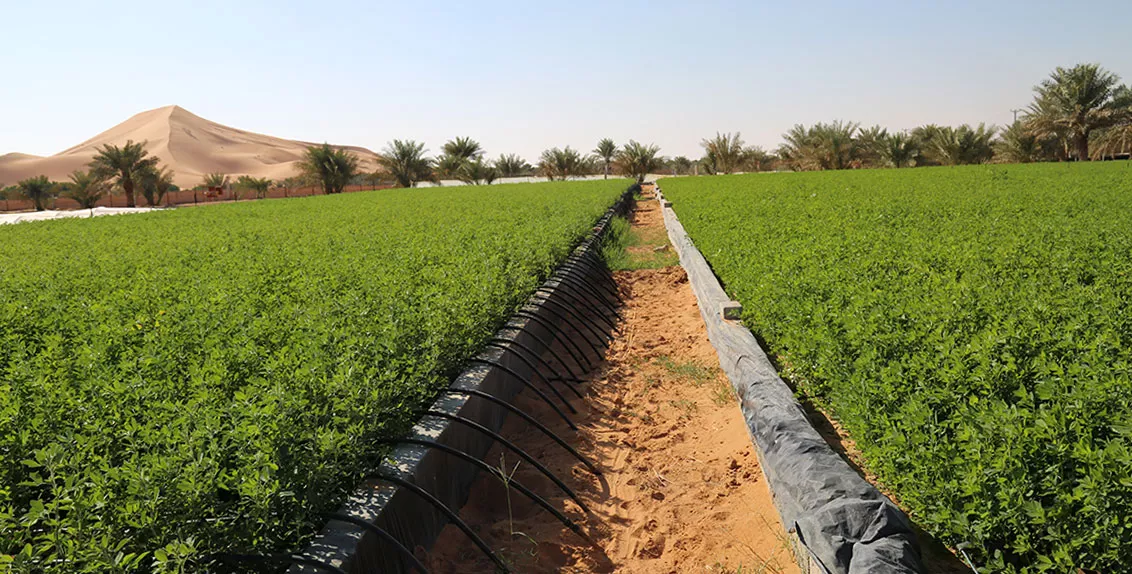Covid-19 bears out UAE’s food security strategy
Tuesday, 31 March, 2020
How Covid-19 threatens global food security
The world is at a standstill. The worldwide spread of Covid-19, the disease caused by the novel coronavirus, is wreaking havoc on many industries. Amid nationwide lockdowns around the globe, whole sectors of the economy have gone into hibernation. International markets and supply chains have been jolted.
Economists warn of a global recession if leading nations do not work together to cushion the impact. According to the United Nations’ trade and development agency, UNCTAD, the world economy is likely to lose to the tune of 1 trillion USD in 2020.
But an economic meltdown might not be the only dark cloud on the horizon. Analysts are raising the alarm about the specter of food shortages and price hikes.
As governments rush to fight the disease, agriculture and food production can take a hit. Preventative measures may lead to labor shortages and delays in supplies of inputs for farmers. This could seriously affect agricultural output. Fresh produce and other perishable goods might go off before they reach consumers if quarantine restrictions slow down their delivery.
Concerns over heightened demand and low production can provoke countries into reducing or banning food exports altogether for fear of running out of reserves for their own people. Alas, some have already put in place temporary trade barriers. It makes sense to suspend the movement of people, but there is no reason to curb the flow of food along the global supply chains.
It might take one or two major food exporters to make a drastic move to cause ripples across the board. In a worst-case scenario, the world risks a repeat of the global food crisis of 2007-2008.
This prospect is both unwelcome and unwarranted as it poses the greatest threat to the most vulnerable in society. While richer nations have resources to cope with food supply disruptions and price spikes, lower-income countries are ill-prepared for any major shocks. Net food importers in Africa are specifically at a high risk. Millions of people might join the ranks of the extremely poor and undernourished.
How to better prepare for food crises
Prolonged supply disruptions can have wide-ranging implications for food security in nearly all countries which heavily depend on food imports. Short-term fixes such as cash and food handouts are essential, especially for the poor, those out of work or ill, but the current uncertainty shows how important long-term food security strategies are.
As a nation dependent on food imports, the UAE offers a good example of how a comprehensive food security strategy can help navigate through potential crises. The country sources around 90 percent of its food from abroad.
The UAE government has always placed food security at the top of its agenda. Over the past years, the country has been at work to bolster its resilience to supply shocks, especially following the lessons of the global food crisis of 2007-2008.
The UAE implements a range of measures, policies and strategies to ensure uninterrupted food supplies from abroad and scale up agricultural production at home.
On the international front, the government mainly focuses on supporting food trade, diversifying sources of food and making agricultural investments. As a result, the UAE has grown into a regional logistics and trade hub for food. Around 70 percent of food imports to the UAE are re-exported to other countries.
On the home front, the government works to maintain sufficient stockpiles of staples and other basic foods, makes market interventions to ensure food availability and affordability, and provides financial and technical assistance to farmers, agri-businesses and research institutions to boost domestic production through agricultural research and development.
In 2017 the government appointed H.E. Mariam bint Mohammed Almheiri as Minister of State for Food Security to streamline all initiatives. And a year later the UAE launched the National Food Security Strategy 2051 with a vision to become a world-leading hub for innovation-driven food security.
The strategy defines the components of the national food basket and includes 38 short- and long-term initiatives. It also spells out five broad goals with a focus on facilitating global food trade, diversifying sources of food imports through partnerships, and enhancing sustainable local food production, among others.
And two years on, the strategy paid off. The country rose from 33rd place in 2017 to 21st in 2019 in the Global Food Security Index, compiled by the Economist Intelligence Unit.
By 2021, the strategy will help to create more than 16,000 jobs, increase agricultural production by over 100,000 tonnes, and achieve economic returns of up to 22 billion AED (around 6 billion USD).
More recently, the government formed the Emirates Food Security Council to coordinate and lead the strategy implementation jointly with federal and local authorities. The council is also charged with establishing a national food security governance system.
In late March 2020 the government also announced a new law that regulates the country’s strategic food reserves. Under the law, registered suppliers and retailers are offered various incentives to secure adequate and uninterrupted food supplies in the country in the event of crises, emergencies and disasters.
Why R&D matters for food security
Food stockpiling and trade are necessary in the short run, but if history is anything to go by, food security should always be buffered by domestic agricultural production in the medium and long term. Although the UAE is short of arable land and freshwater resources, it has more than 40,000 farms today.
As little grows in local conditions and farming is resource-intensive, the country bets on innovation. The National Food Security Strategy gives priority to agricultural research and development.
The government creates various programs, incentives and policies to turn the country into a magnet for agri-tech start-ups and innovators. This work is already producing results. For example, the number of hydroponic farms grew from 50 in 2009 to around 1,000 in 2017. The number of vertical farms is also on the rise. In recent years, many have sprung up across the country, with more to open in the near future.
In September 2019 the Food Security Office launched the FoodTech Challenge, a global competition for sustainable innovative solutions tailored to the food and agricultural sectors in the UAE. There are also plans to set up a food innovation ecosystem akin to the Silicon Valley. Colloquially called the Food Valley, the ecosystem is hoped to bring together research institutions, universities and the private sector to innovate new ways of food production and develop new food systems.
But some of the government’s early efforts go back to the late 1990s when the International Center for Biosaline Agriculture (ICBA) was established in the country in cooperation with the Islamic Development Bank (IsDB) and several other organizations. Over the years, ICBA has become a go-to authority on sustainable agriculture in marginal environments. The center focuses on alternative crops and technologies which are better adapted to harsh environmental conditions. Many of these crops and technologies have proven suitable for local conditions too. For example, the center is currently working with several companies to make foods from locally grown quinoa and Salicornia.
Scientists have also identified a number of halophytic, or salt-loving, plants that produce higher yields than some traditional grasses and help to save more water.
ICBA is also promoting inland and coastal modular farming technologies which use reject brine and seawater for irrigation. The inland modular farm uses desalinated water for vegetables, reject brine for fish, and aquaculture effluents for halophytic plants, while the coastal modular farm uses seawater for fish and aquaculture effluents for halophytic plants like Salicornia.
The UAE has a harsh desert environment for farming, but the government is making sure that the agricultural research and development landscape is hospitable for innovation. Although the country does not have plenty of arable land and water, its success story shows that what really counts is resourcefulness.












